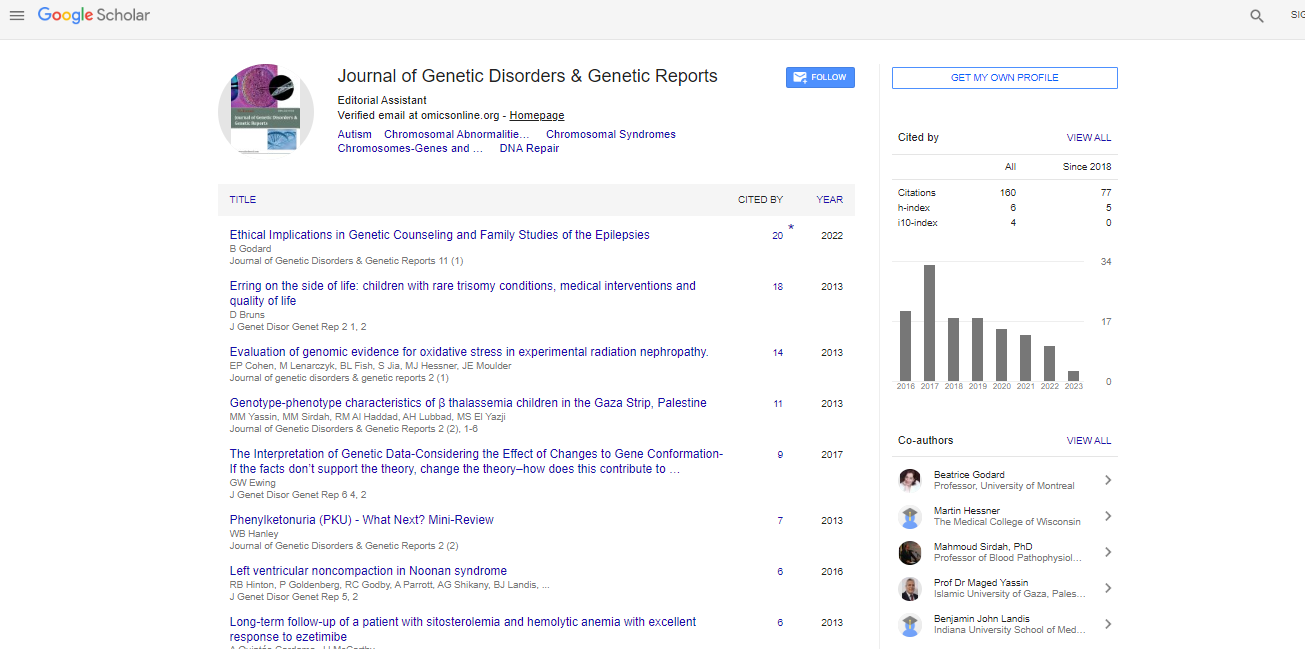Opinion Article, J Genet Disor Genet Rep Vol: 12 Issue: 5
Integrative Genomics Approaches Unraveling the Complexity of Uncommon Genetic Disorders
Dalton Smith*
1Laboratory of Bacteriology, The Rockefeller University, New York, USA
*Corresponding Author: Dalton Smith,
Laboratory of Bacteriology, The
Rockefeller University, New York, USA
E-mail: smithdalton98@rfu.edu
Received date: 25 September, 2023, Manuscript No. JGDGR-23-120550;
Editor assigned date: 28 September, 2023, PreQC No. JGDGR-23-120550 (PQ);
Reviewed date: 12 October, 2023, QC No. JGDGR-23-120550;
Revised date: 19 October, 2023, Manuscript No. JGDGR-23-120550 (R);
Published date: 26 October, 2023, DOI: 10.4172/2576-1439.1000227.
Citation: Smith D (2023) Integrative Genomics Approaches for Unraveling the Complexity of Uncommon Genetic Disorders. J Genet Disor Genet Rep 12:5.
Description
Uncommon genetic disorders present unique challenges due to their rarity and heterogeneity. The application of integrative genomics approaches in the study of uncommon genetic disorders, providing insights into the molecular mechanisms, diagnostic advancements, and therapeutic opportunities. Through a synthesis of recent research findings and case studies, this article aims to showcase the power of integrative genomics in unraveling the complexity of these disorders and guiding precision medicine strategies.
Uncommon genetic disorders, often characterized by their low prevalence and diverse clinical manifestations, pose diagnostic and therapeutic challenges. The concept of integrative genomics as a comprehensive approach that combines various genomic techniques to elucidate the molecular basis of these disorders. By integrating genomics, transcriptomics, epigenomics, and other omics data, researchers can gain a holistic understanding of the genetic landscape of uncommon disorders.
Integrative genomics techniques
This section provides an overview of the key integrative genomics techniques employed in the study of uncommon genetic disorders. Techniques such as whole-genome sequencing, RNA-sequencing, and epigenomic profiling are discussed in the context of their contributions to unraveling the genetic and molecular complexity of rare disorders. The synergy between these techniques offers a multi-dimensional view, enabling researchers to identify causative genetic variants, explore gene expression patterns, and investigate epigenetic modifications.
Uncommon genetic disorders case studies
The select case studies to exemplify the power of integrative genomics in unraveling the complexity of uncommon genetic disorders. Through these cases, we explore instances where the integration of genomic data has led to the identification of novel disease-causing genes, elucidation of disease mechanisms, and improved diagnostic precision. The cases underscore the importance of adopting an integrative genomics approach in understanding the pathophysiology of rare disorders.
Diagnostic advancements
Integrative genomics has revolutionized the diagnostic landscape for uncommon genetic disorders. This section discusses how the integration of various genomic data sets enhances the accuracy and efficiency of diagnosis. The identification of disease-causing variants, the discovery of genotype-phenotype correlations, and the development of diagnostic panels tailored to specific genetic disorders are highlighted as key advancements facilitated by integrative genomics.
Therapeutic opportunities
Understanding the molecular basis of uncommon genetic disorders is important step towards developing targeted therapeutic interventions. Integrative genomics enables the identification of potential therapeutic targets and the exploration of personalized treatment strategies. This section explores how insights gained from integrative genomics studies can inform the development of novel therapies, including gene therapies, precision medicines, and targeted interventions.
Challenges and future directions
While integrative genomics holds great promise, it is not without challenges. This section discusses the computational and analytical hurdles associated with handling vast and diverse genomic datasets. Moreover, considerations regarding data interpretation, standardization, and integration across different platforms are addressed. Future directions include the need for improved collaboration, data sharing, and the development of standardized methodologies to fully harness the potential of integrative genomics in rare disorder research.
Conclusion
Integrative genomics approaches have emerged as powerful tools in the study of uncommon genetic disorders, offering a holistic understanding of their molecular basis. The synthesis of diverse genomic data sets provides a comprehensive view that facilitates precise diagnosis and opens avenues for targeted therapeutic interventions. As we navigate the complexities of rare genetic disorders, integrative genomics stands as a beacon, guiding researchers and clinicians toward unraveling the mysteries of these conditions and advancing precision medicine.




